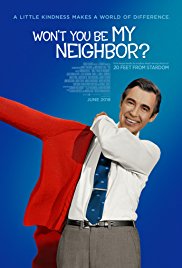Won't You Be My Neighbor?
Won't You Be My Neighbor?
Starring Fred Rogers
Directed by Morgan Neville
The Story:
"Won't You Be My Neighbor?" is a documentary film telling the life of Fred Rogers, who started a children's programming show in 1968 in a small Pittsburgh studio that blew up into an international sensation. The film interviews those who knew him best (including his wife Joanne and his now-grown children) as they share Fred's ups and downs, how he tackled important issues for children, and proved that a nice guy can really finish first.
The Synopsis:
Growing up in the 80s, I remember seeing "Mister Roger's Neighborhood" when I went to my grandma's house. I don't remember a lot about it, but I remember really enjoying the program despite also liking the classic 80s children action shows like "Transformers" and "G.I. Joe." "Mister Roger's Neighborhood" was something ultimately different and, as mentioned several times in the film, radical - it was a program for children, but it wasn't wall-to-wall action and talking, nor was it a mere slapstick program. Instead, it tackled hard-hitting topics, and included long moments of silence and dead air, but none of it - as also mentioned in the documentary - was wasted.
We see Fred Rogers as a man far ahead of his time, who wanted to reach out to children through this new medium called television. To do this, he creates a show that separates reality from fantasy - in the real world, he comes into his home and puts on his traditional cardigans and tell us a story and sing us a song. Then the small trolley travels into the Neighborhood of Make-Believe, where Rogers used puppets and actors to tell special stories. These puppets became iconic - from King Friday XIII (who is the egocentric, frightened by change ruler of the land who wishes to build a wall) to X the Owl and Henrietta Pussycat - who traverse the land and brought joy to the hearts of millions of children.
Yet the most personal puppet to Rogers was Daniel Striped Tiger, who is used in illustrations in the film because, as Rogers' wife mentions, Daniel was the evocation of her husband's childhood feelings of insecurity and need to be loved. In one particularly tear-inducing scene, we witness the moment where Daniel feels like he was a mistake - something you'd never see in a children-friendly show nowadays - and it's all too hauntingly real. Even though the actress playing next to him tried to comfort him, Daniel still had his doubts whether or not he was a mistake.
This is just one of the examples of how Rogers used real life events and situations to not pander to the children who viewed him, but rather as a way to help them understand. During the Vietnam War, he showed episodes of the puppets wanting peace. During the Civil Rights movement, he shows an episode of himself sharing a kiddie pool with an African American man. His message was timeless and endearing - we must love one another, and love ourselves. We are all special, and we don't have to do anything to be special.
This, as mentioned in the film, angered some modern-day talking heads who claim this generation's sense of entitlement comes from Rogers, but that's as far removed from the truth as anything. Fred Rogers made us feel loved and appreciated just who we are, and we don't have to conform or change to feel acceptance. Even Rogers, during his life, encountered real-life demons who wished to vilify him - claiming he was a closeted gay man, a man with tattoos everywhere, or some other deep dark secret. There was no way a man could be this wholesome, this sincere, this amazing. Yet, he was.
"Love is at the root of everything. All learning, all relationships...love, or the lack of it." Such profound, prolific, poignant words spoken that echoes through time. Fred Rogers showed true love to his viewers, because he truly loved them. This caused children to love one another, despite their outward appearances. This caused adults to learn to love more. Nowadays, we tend to side on the "lack of" love that results in fights, commotions, and online disagreements that turn sour and vindictive. If only we listened to Fred Rogers today.
In today's world, there's more divisive rhetoric, more angry protests, more smut on television than you can shake a stick at. Would a show like "Mister Roger's Neighborhood" survive today? Absolutely not. A man who enjoys the company of children? He would be labeled a pedophile. A children's show where real life issues are discussed in frank ways, with multiple silent moments? He'd be canceled after one episode. While we need a man like Fred Rogers even more today, there's no room for a man of his caliber to be on our screens anymore. And that, ultimately, is the saddest thing of all.
The Summary:
For being such a simple man, Fred Rogers revolutionized the world in ways unheard of, resulting in children feeling appreciated and loved, and we all wanted to be Mr. Rogers' neighbor - "Won't You Be My Neighbor" is the exact type of film we need right now - and we desperately need another Mr. Rogers now more than ever.
The Score: A+




Comments
Post a Comment